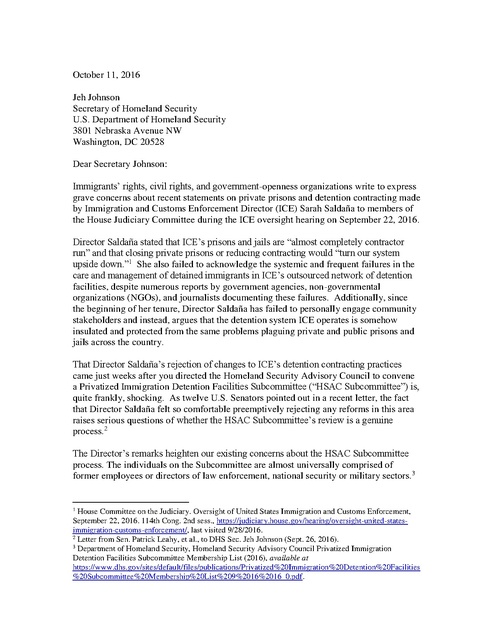Joint letter re Immigration and Customs Enforcement policies - October 2016
Download original document:

Document text

Document text
This text is machine-read, and may contain errors. Check the original document to verify accuracy.
October 11, 2016 Jeh Johnson Secretary of Homeland Security U.S. Department of Homeland Security 3801 Nebraska Avenue NW Washington, DC 20528 Dear Secretary Johnson: Immigrants’ rights, civil rights, and government-openness organizations write to express grave concerns about recent statements on private prisons and detention contracting made by Immigration and Customs Enforcement Director (ICE) Sarah Saldaña to members of the House Judiciary Committee during the ICE oversight hearing on September 22, 2016. Director Saldaña stated that ICE’s prisons and jails are “almost completely contractor run” and that closing private prisons or reducing contracting would “turn our system upside down.”1 She also failed to acknowledge the systemic and frequent failures in the care and management of detained immigrants in ICE’s outsourced network of detention facilities, despite numerous reports by government agencies, non-governmental organizations (NGOs), and journalists documenting these failures. Additionally, since the beginning of her tenure, Director Saldaña has failed to personally engage community stakeholders and instead, argues that the detention system ICE operates is somehow insulated and protected from the same problems plaguing private and public prisons and jails across the country. That Director Saldaña’s rejection of changes to ICE’s detention contracting practices came just weeks after you directed the Homeland Security Advisory Council to convene a Privatized Immigration Detention Facilities Subcommittee (“HSAC Subcommittee”) is, quite frankly, shocking. As twelve U.S. Senators pointed out in a recent letter, the fact that Director Saldaña felt so comfortable preemptively rejecting any reforms in this area raises serious questions of whether the HSAC Subcommittee’s review is a genuine process.2 The Director’s remarks heighten our existing concerns about the HSAC Subcommittee process. The individuals on the Subcommittee are almost universally comprised of former employees or directors of law enforcement, national security or military sectors.3 1 House Committee on the Judiciary. Oversight of United States Immigration and Customs Enforcement, September 22, 2016. 114th Cong. 2nd sess., https://judiciary.house.gov/hearing/oversight-united-statesimmigration-customs-enforcement/, last visited 9/28/2016. 2 Letter from Sen. Patrick Leahy, et al., to DHS Sec. Jeh Johnson (Sept. 26, 2016). 3 Department of Homeland Security, Homeland Security Advisory Council Privatized Immigration Detention Facilities Subcommittee Membership List (2016), available at https://www.dhs.gov/sites/default/files/publications/Privatized%20Immigration%20Detention%20Facilities %20Subcommittee%20Membership%20List%209%2016%2016_0.pdf. The review process itself remains unclear, and the HSAC has not communicated its plan for consultation with the public. Although the Subcommittee did meet with a small number of organizations earlier this week, the meeting was on very short notice, lasted only an hour, and did not include critical stakeholders, including most of the organizations involved in collecting over 200,000 signatures from individuals calling for an end to the privatization of immigration detention.4 Most importantly, the Subcommittee has not stated whether it will solicit input directly from detained and formerly detained immigrants themselves. We further urge you to direct the HSAC Subcommittee to consider other changes to DHS policies and practices that would facilitate ending its private prison contracts, including measures to reduce detention and implement safeguards to ensure humane conditions. As the Deputy Attorney General’s August 18, 2016 memorandum on DOJ’s private prison phase-out made clear, DOJ’s commitment to ending its private prison contracts goes hand in hand with its decision to adopt smarter sentencing practices that reduce the federal population.5 If DHS seeks to follow in DOJ’s footsteps, analogous detention reforms will need to be a part of its plan. However, the HSAC Subcommittee has already indicated that it does not consider this crucial topic to be within its purview. We are hopeful that your office does not view this process as having a foregone conclusion, and we would like to meet with you immediately to discuss the ongoing review process. Please feel free to contact Mary Small at msmall@detentionwatchnetwork.org or Paromita Shah at paromita@nipnlg.org. Sincerely, Alianza Americas Capital Area Immigrants’ Rights Coalition Center for Gender & Refugee Studies Church World Service Community Initiatives for Visiting Immigrants in Confinement (CIVIC) Detention Watch Network Hebrew Immigrant Aid Society (HIAS) Human Rights Defense Center Illinois Coalition for Immigrant and Refugee Rights (ICIRR) Immigrant Legal Resource Center (ILRC) Mijente National Council of Jewish Women, Inc. National Immigrant Justice Center (NIJC) Rafi Schwartz, “Former immigrant detainees confronted the Secretary of Homeland Security about the private prison industry,” Fusion (Sept. 29, 2016), available at http://fusion.net/story/352294/jeh-johnsonice-detention-prison-dhs/ 5 Memorandum from Sally Yates, Deputy Attorney General, Reducing Our Use of Private Prisons, Aug. 18, 2016, available at https://www.justice.gov/opa/file/886311/download . 4 National Immigration Law Center (NILC) National Immigration Project of the NLG (NIPNLG) Not One More Deportation Campaign NWDC Resistance and Latino Advocacy OpenTheGovernment.org Presente.org Refugee and Immigrant Center for Education and Legal Services (RAICES) Southern Poverty Law Center United We Dream U.S. Committee for Refugees and Immigrants We Belong Together
